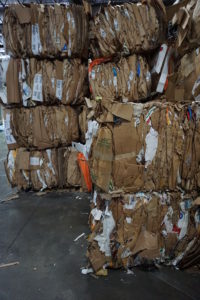Scrap recycling continues to be a powerful force for good in the U.S. economy, confirms a new study by the Institute of Scrap Recycling Industries, Inc. (ISRI). The ISRI commissioned economic consulting firm John Dunham & Associates to complete an economic impact analysis of the scrap recycling industry, as it does every two years. Its goal is to quantify the current scope of this industry. This year’s study confirmed what insiders already knew: the scrap recycling industry is both an economic and an environmental boon in the U.S., as it has been for decades.
Highlights
-More than half a million jobs can be directly or indirectly attributed to the scrap recycling industry, representing a total of $109.78 billion in economic benefits.
-The industry generates nearly $5 billion in state and local revenues each year.
-The scrap industry exported $20 billion in products to more than 150 countries in 2018.
-138 million metric tons of materials were recycled by the scrap industry in 2018.
Jobs Impact
 The ISRI’s study confirms that the scrap recycling industry continues to be a major job creator. Its authors found that 164,154 jobs were directly supported by scrap recycling in the U.S. during 2019, with the workers in those jobs receiving wage and benefit packages averaging $73,000 annually. That’s an increase of nearly 10,000 directly-created jobs from the ISRI’s 2017 study, which directly attributed 155,632 jobs to the industry.
The ISRI’s study confirms that the scrap recycling industry continues to be a major job creator. Its authors found that 164,154 jobs were directly supported by scrap recycling in the U.S. during 2019, with the workers in those jobs receiving wage and benefit packages averaging $73,000 annually. That’s an increase of nearly 10,000 directly-created jobs from the ISRI’s 2017 study, which directly attributed 155,632 jobs to the industry.
Every state in the U.S. has jobs created by scrap recycling. Texas boasts the most; more than 12,000 jobs there are directly supported by the industry. (Here in Miller Recycling’s home state of Massachusetts, scrap recycling has an economic impact of more than $2.1 billion per year!)
An additional 367,356 jobs in the U.S. economy were indirectly supported by the industry, for a total of 531,510 jobs; these numbers include workers who purchase, process and broker scrap metal. That’s a slight decrease from the 2017 study, which attributed a total of 534,506 jobs to scrap recycling. The study’s authors note that exporting recycled scrap also directly supports more than 50,000 American jobs in 2019. In total, more than 160,000 jobs are directly or indirectly supported by scrap recycling exports in the United States.
Economic Impact
 The economic impact of the scrap recycling industry goes far beyond just the wages it generates for workers. Using data from the Bureau of Economic Analysis, the study found that the industry generates nearly $110 billion in economic benefits each year here in the United States. The scrap industry and its employees pay $7.96 billion in federal taxes each year. The industry also generates nearly $5 billion in state and local revenue each year, stimulating local economies.
The economic impact of the scrap recycling industry goes far beyond just the wages it generates for workers. Using data from the Bureau of Economic Analysis, the study found that the industry generates nearly $110 billion in economic benefits each year here in the United States. The scrap industry and its employees pay $7.96 billion in federal taxes each year. The industry also generates nearly $5 billion in state and local revenue each year, stimulating local economies.
While scrap recycling continues to be a robust industry, this most recent ISRI study found that its reach has slightly diminished in the last few years.
The scrap recycling industry accounted for 0.63 percent of total economic activity in the U.S in 2017, but this year, the industry accounted for 0.54 percent. Furthermore, the industry’s economic impact has shrunk slightly, from $117 billion in 2017 to just under $110 billion now.
Environmental Impact
 The environmental benefits associated with the scrap recycling industry are harder to quantify than the economic benefits. The study’s authors note that recyclers processed 138 million metric tons of scrap in 2018, keeping a huge quantity of materials out of landfills. Recycling all of that scrap all reduces the demand for new materials, translating to incalculable reductions in greenhouse gas emissions.
The environmental benefits associated with the scrap recycling industry are harder to quantify than the economic benefits. The study’s authors note that recyclers processed 138 million metric tons of scrap in 2018, keeping a huge quantity of materials out of landfills. Recycling all of that scrap all reduces the demand for new materials, translating to incalculable reductions in greenhouse gas emissions.
Miller Recycling is a proud part of the thriving scrap recycling industry, and by extension, an important contributor to our local economy. We’re here to help you easily dispose of your scrap in a way that’s both financially and environmentally sound. Contact us today to learn more about our scrap recycling services.

